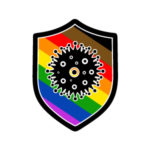
Coping with Crisis
Dealing with COVID-19 stress without popping open a Corona.
The coronavirus (COVID-19) is a global health disaster of epic proportions. If it feels like you’re living in “the upside-down,” frankly it’s because you are. Everything has shifted, seemingly overnight.

Restaurants and bars? Shut down. Schools? Shut down. Public spaces, concerts, movie theaters, sporting events? All shut down.
But what about our emotional state?
Manage Anxiety with Activity
Most of us are on high alert these days. Bodies and brains are buzzing with nervous energy, and maybe you just don’t know what to do with yourself. Nothing seems to ratchet down your anxiety, especially since your usual activities and stress-relievers are unavailable. Of course, all of this can increase your risk with COVID-19.
How do you occupy your time when the distractions don’t work anymore, or when you can’t numb out with social media for another second and you’ve watched everything interesting on Netflix? What happens when emotional eating, drinking, and smoking stops working?
All of these frayed nerves signal opportunity—a chance to research, learn, and practice new skills. Just because you feel out of control doesn’t mean you have no power in this situation. This could be the ideal time to learn the art of mindfulness by starting a gratitude or meditation practice. There are plenty of free smartphone apps, YouTube videos, and websites devoted to practicing mindfulness.
Explore new interests. Finding a hobby is one of the easiest (or the hardest) things to try. But at some point, we have all said “When I get more time, I’ll . . .” Remind yourself how you finish that sentence, and then go out and try it! When else are you going to have this kind of time without distractions? Perhaps there’s a book you’ve always meant to read, or a podcast you’ve wanted to develop. There’s no shortage of new things you can try.
Don’t Just Distract. Connect!
Many of us are just trying to manage the stress of uncertain and constantly changing guidance from our elected leaders. Many others are trying to live in denial, which works until it doesn’t. While we may be telling our friends and family how fine we’re doing, our behaviors tell a different tale. Irritability, becoming easily frustrated over little things, poor sleep and eating habits, or increased drinking and drug use can all signal just how fine we aren’t doing.
Honestly and openly acknowledging our fears and anxieties can be helpful in crisis situations such as this, allowing us to discharge the emotional energy behind the behaviors. Saying to someone, “Yes, I feel the same way,” or “I’m also freaking out,” creates opportunities for connection with others. Trying to offer a fix isn’t necessary; simply being with another person is sometimes enough. While this may not immediately translate into choosing different behaviors or activities, over time it can certainly make it easier to put down the bottle and pick up the phone instead.
Develop a Schedule
What does stress management look like in a time when social distancing and curtailed public activity is the new normal? Creating a routine while sequestered at home can be helpful. What things should be done during the morning? What things can occupy time during afternoons or evenings? Having a plan for how your day will unfold can be the one predictable thing in this sea of unpredictability.
Also, scheduling limited TV and computer screen time can help guard against falling down the rabbit hole. There’s nothing wrong with binge-watching television, and distraction isn’t necessarily a bad thing—in moderation. Make time on the calendar for other activities, such as walking around the apartment or house and going outside for a bit of fresh air (while keeping six feet away from others). Build in breaks from the news and social media. Physical activity reminds us that we are more than armchair movie critics and keyboard warriors.
Too Much of a Good Thing?
How much information is too much? While staying informed is definitely important, obsessively reading about COVID-19 is probably not helpful. Eventually there comes a point where we reach saturation and the information we take in begins working against us, adding to our existing anxiety and creating panic.
Finding the line between too little and too much is a delicate balance. You may not know when you’ve had too little, but you certainly know when enough is enough. Your brain and your body will tell you. Pay attention to those moments. While you’re at it, seek public-safety information and updates from reputable sources while avoiding fake news and harmful conspiracy theories, which only add to the confusion and stress.
The Sobering Truth
For many, this is much more than a crisis of managing stress while sheltering in place. Entire industries are on hiatus or shutting down. Without customers, many businesses will close, never to return. Employees will find themselves out of work, perhaps for the first time in years, and with their future prospects blanketed in uncertainty. The economic fallout on top of the public health crisis will likely be tremendous.
Supporting others during this time can help refocus negative feelings and energy, spark creativity and collaboration, and provide not only distraction, but emotional healing. Explore how you can be of service to others.
Banding together in times of crisis—a highly prized and valued part of our character as Houstonians—has always sustained us. And it will continue to do so, no matter what we must face.
This article appears in the April 2020 edition of OutSmart magazine.










